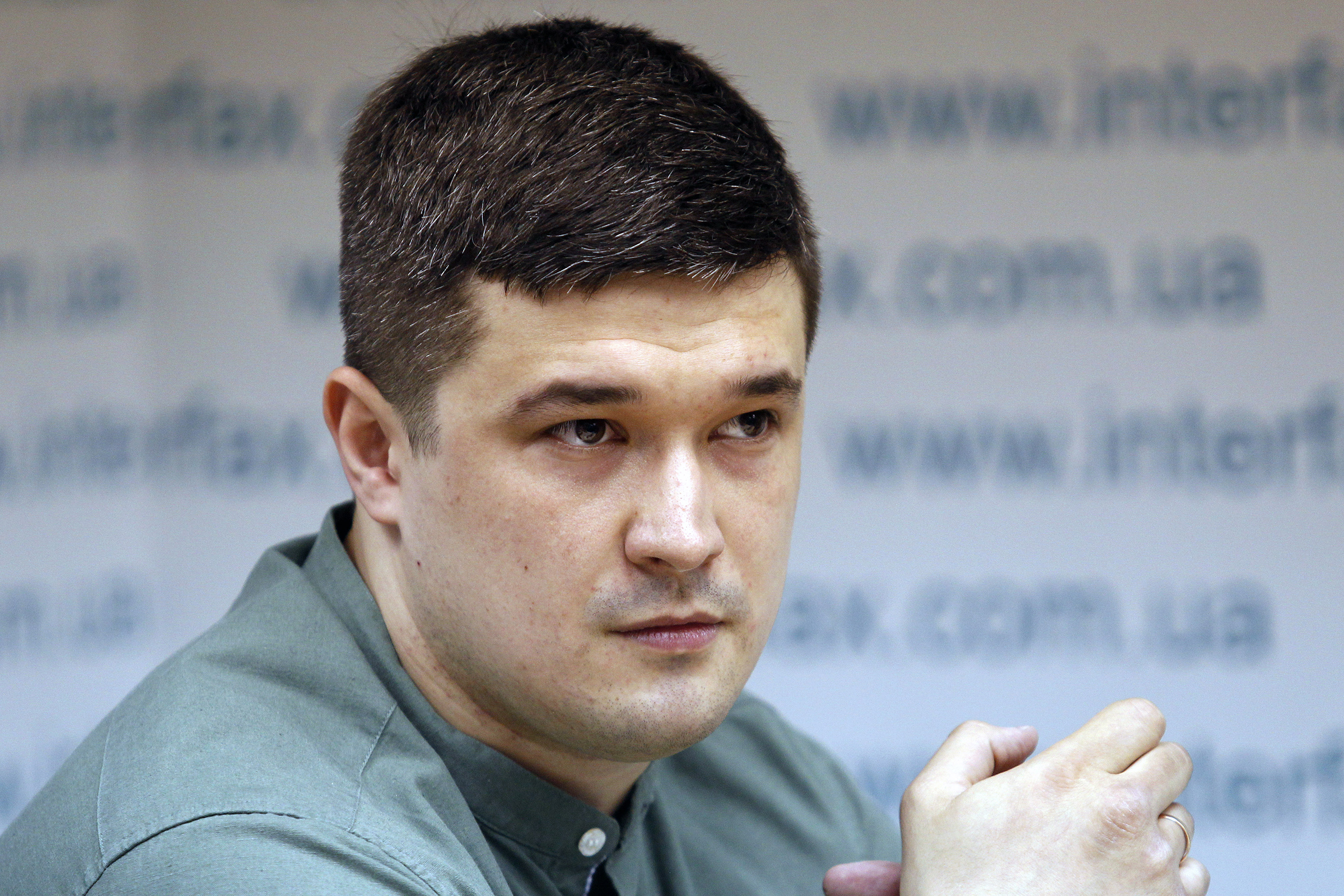
Less than 48 hours after appealing to Elon Musk on Twitter, Ukraine’s Minister of Digital Transformation, Mykhailo Fedorov, posted a photo of a truckload of satellite dishes. The SpaceX founder had come through with help for Ukrainians trying to connect to the Internet amid Russia’s invasion, Fedorov said in the Feb. 28 tweet: “Starlink—here. Thanks, @elonmusk.”
Many marveled at the seemingly miraculous speed with which the 31-year old former IT entrepreneur, who is now serving as Ukraine’s youngest cabinet minister, had been able to enlist the help of the world’s richest man. But Fedorov wasn’t surprised. “This only appeared to be a quick and spontaneous reaction by Mr. Musk,” he told TIME in an interview. “In fact, we had done a lot of homework… and our discussion was in a very advanced stage.”
Such stagecraft is one example of how Fedorov has led Ukraine’s successful efforts to fight a modern digital war against Russia. From the outside, his ministry’s work has seemed almost effortless, countering the Kremlin’s notorious disinformation campaigns, galvanizing worldwide support through social media, and shaming the world’s largest tech companies into blocking services in Russia. But beneath the surface, these successes are built on years of ambitious ventures that turned the country into a growing tech hub before the war.
In the process, Fedorov and Ukraine’s young entrepreneurial class are inventing a whole new way to fight a war online. Their relentless social media campaigns have flooded the Internet with constant updates on military and diplomatic successes, and helped them recruit an “IT Army” as well as foreign fighters. Having previously used Telegram during the 2019 Ukrainian presidential campaign, President Volodymyr Zelensky’s team has been able to rely on existing infrastructure when the messaging app turned into the main front in the information war. Fedorov’s ministry also set up a cryptocurrency fund that has raised more than $63 million worth of donations for the Ukrainian military.
Read More: How Putin Is Losing at His Own Disinformation Game in Ukraine
“I think the future is with tech, and this is why we will win,” he said. Wearing a gray turtleneck and white AirPods, he spoke to TIME on a video call from an undisclosed location somewhere near Kyiv. “Russia’s leadership still lives in the 20th century,” Fedorov said. “They have failed to notice that… governments must move towards becoming more and more like tech companies, rather than being rigid like a tank, like a war machine.”

The match up—military hardware vs. digital savvy—is set to play a key role in the next phase of the war. As the Russian military continues its brutal offensive, leaving behind destroyed cities and hundreds of dead civilians, the Ukrainian government is keeping the world’s attention on the conflict through a steady stream of official posts on social media and messaging apps. These range from informal, personal videos from Zelensky, to regular updates meant to “pre-bunk” Russian disinformation, to direct appeals to Russians themselves. “I could even say it’s our home turf,” says Fedorov, who ran Zelensky’s digital campaign before being appointed to his current role in August 2019.
“We are trying to protect our brand”
As the horrors of the war play out for the watching world online, Ukrainian officials say they intend to take and hold the “moral high ground” in the global battle for hearts and minds. Fedorov says he and his colleagues are vigilant for any disinformation from their own side that could break the trust and goodwill they have built up, putting teams and processes in place to verify the facts in all updates posted by Ukrainian officials. That emphasis on credibility, Fedorov says, is a “force multiplier.” “In a way, we are trying to protect our brand,” he says, wryly noting that he knows it sounds “peacetime-y” in this context. “Our brand as one of an honest nation and an honest people trying to tell the truth.”
Ukraine has long been on the receiving end of Russian disinformation campaigns and cyberattacks, so they were familiar with their tactics and were able to build some resilience, Fedorov says in his interview with TIME, which was conducted through a translator. Soon after the invasion, he called for the creation of what he called an “IT Army,” which has grown to over 300,000 volunteers—many from its vast network of tech company representatives and cybersecurity specialists—whom Ukrainian leaders coordinate to fight Russian intrusions through secure messaging groups. The ministry has also raised more than $63 million in cryptocurrency for the Ukrainian military.
Ukraine’s digital officials have also focused on creating what they call a “digital blockade” of Moscow, upping the pressure by isolating Russia from the Internet and the global economy through public appeals to big tech companies. Fedorov, backed up by Zelensky and other officials, has tweeted often emotional requests to the CEOs of Apple, Google, Cloudflare and Meta. “Mark Zuckerberg, while you create Metaverse—Russia ruins real life in Ukraine!” he tweeted at the Meta CEO on Feb. 27. “They kill our children, now kill their access!” he tweeted at Apple CEO Tim Cook on March 1, asking him to block Russians from the App Store.
Many of these pressure campaigns have worked: Apple cut off Apple Pay and paused the sale of its products in Russia, and companies including Google, Meta, and a host of social media platforms restricted its services within Russia and banned or demonetized Russian state-run media content. “We’ve been quite happy with how many companies are doing the right thing and stopping their operations in Russia,” says Fedorov. Their next step is to target the Russian tech industry, “so that they cannot make money, they cannot operate, they cannot spend money to hire talent, and thus they will wake up to reality and exert pressure on the government to stop this bloody war against Ukraine.”
“They’re on the side of truth or they’re with Russia”
Zelensky’s pre-war promise to make Ukraine a “digital leader” seems to be paying off for ordinary Ukrainians as well. Fedorov’s team, which spent years digitizing the country’s government services with the goal of turning Ukraine into a “paperless” pioneer, have found these are essential in a modern war. The ministry has been updating the services it provides through an app called Diaa, a portal launched in 2020 that lets Ukrainians share digital identifying documents on their smartphones for more than 50 government services. At the time, Fedorov said that Ukraine would become the first country where digital passports were legally equivalent to traditional ones. The app’s digital IDs and passports for Ukrainian citizens have proved a crucial link for many of the more than 1.9 million estimated internally displaced people in the country, as well as a way to access government services and funds.
Through it all, Fedorov says he still has his eyes set on the post-war future, in which he thinks Ukraine’s digital economy will play a crucial role in its recovery. “Let’s say that the war has indeed thrown a lot on our plate,” he says, but he still speaks enthusiastically of the projects he’s had to put on hold, including one with Apple to run a digital census in 2023 and efforts to allow Ukrainians to vote online. “Wars are often not black and white, but this war is as black and white as it gets,” says Fedorov. “Now is high time for everybody—companies, businesses, governments and people—to make a clear cut choice whether they’re on the right side, or they’re with Russia, whether they’re on the side of truth or they’re with Russia. Every drop counts in this ocean.”
More Must-Reads from TIME
- Cybersecurity Experts Are Sounding the Alarm on DOGE
- Meet the 2025 Women of the Year
- The Harsh Truth About Disability Inclusion
- Why Do More Young Adults Have Cancer?
- Colman Domingo Leads With Radical Love
- How to Get Better at Doing Things Alone
- Michelle Zauner Stares Down the Darkness
Write to Vera Bergengruen at vera.bergengruen@time.com